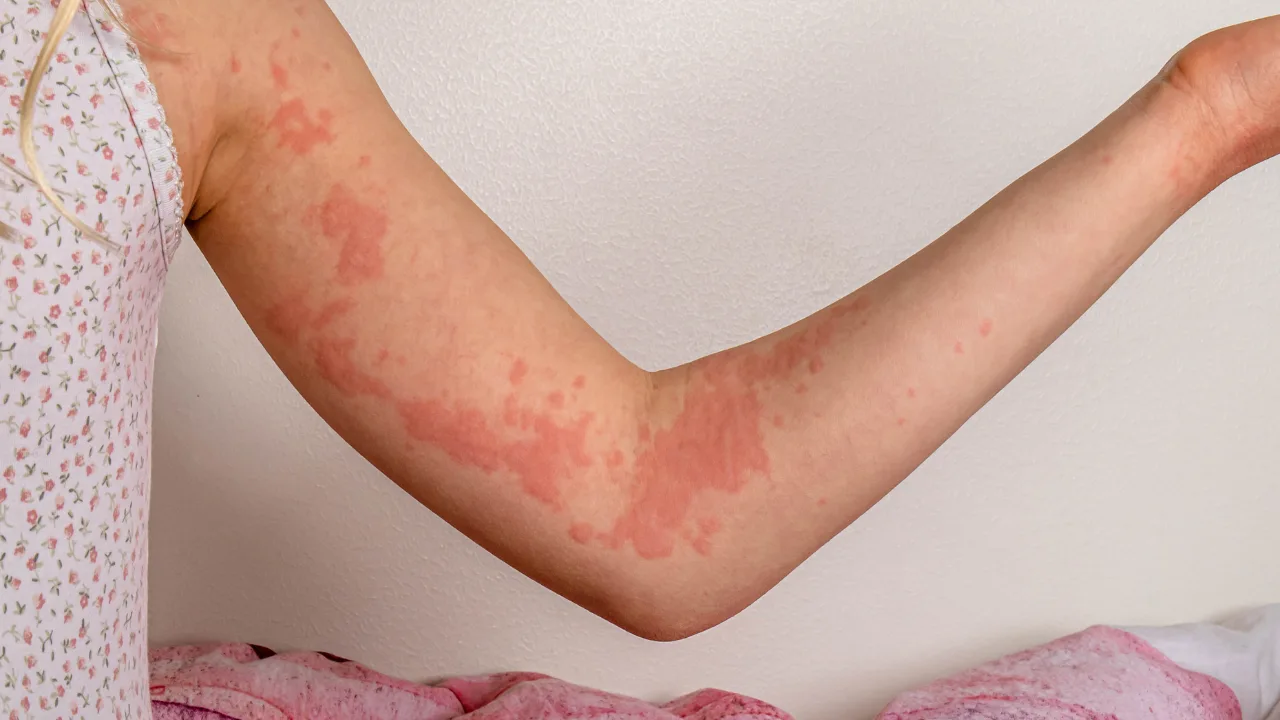Description
A dermatological condition known as chronic autoimmune urticaria (CAU), often called chronic idiopathic urticaria (CIU), has been defined by the recurrent development of hives, or even wheals, across the skin along with itching and, in some instances, angioedema, or swelling under the skin. In contrast to acute urticaria, which often lasts for less than six weeks, these symptoms last for at least six weeks, making them a chronic form of the disease. Complex underlying mechanisms, including autoimmune and inflammatory responses, underlie CAU.
Wheals, raised, colored skin lesions that are frequently accompanied by itching, are the primary characteristic of CAU. These wheals can form anywhere on the body, differ in dimensions and form, disappear in 24 hours, and frequently recur in other places. The condition’s protracted nature can have a significant negative effect on a person’s quality of life, including discomfort, worry, and a reduced capacity for doing daily tasks.
You May Also Like:
IgA nephropathy / Berger’s disease: Description, Causes, and Treatment Protocol
Chronic autoimmune urticaria: Description, Causes, and Treatment Protocol is an original (MedNewsPedia) article.
Possible Causes
Persistent itching, wheals, and angioedema are symptoms of the perplexing dermatological disorder known as chronic autoimmune urticaria (CAU). Although the precise causes of CAU are still unknown, new research indicates a complex interaction of genetic, autoimmune, and environmental variables that support its development. These components are as follows: –
Genetic Predisposition: The likelihood of developing CAU is influenced by genetic factors. According to studies, the illness may have a hereditary propensity, and that some genetic changes may make it more likely to occur. Nevertheless, research into inherited traits and relevant genes is still ongoing.
Autoimmune Dysfunction: CAU may have autoimmune dysfunction, according to an intriguing theory. Autoantibodies that specifically target receptors on basophils and mast cells are produced when the immune system mistakenly perceives parts of cells within the body as foreign invaders. Histamine and additional inflammatory mediators are released as a result of this immunological response, causing the typical wheals and itching that are present in CAU patients.
Environmental Triggers: When CAU first develops or worsens, environmental variables may play a role. The immune system’s propensity to be stimulated by infections, specifically viral infections, has been suggested as a potential cause of CAU. Also contributing to the activation or amplification of immunological responses that cause CAU symptoms are hormonal changes, stress, and particular foods or chemicals.
Immune Dysregulation: The equilibrium between anti-inflammatory and pro-inflammatory signals may be upset by an underlying immunological dysregulation, creating an environment that is favorable to the growth of CAUs. This imbalance may result from a mix of genetic predispositions and outside factors.

Exacerbating and Mitigating Factors
Angioedema, itching, and chronic wheals are the hallmarks of the dermatological disorder known as chronic autoimmune urticaria (CAU). A number of variables, such as the ones listed below, can affect the frequency and intensity of symptoms: –
Following are some of the reasons that make CAU worse: –
Heat and Physical Exertion: Heavy exercise, heat exposure, and perspiration can cause histamine release and aggravate symptoms. Exercise-induced urticaria is the term for this. Mast cells can be activated and wheals can be brought on by friction and elevated body temperature.
Stress and Emotional Issues: CAU has been associated with exacerbations of anxiety, psychological stress, and emotional distress. Stress hormones are released when we are under stress, and these hormones can boost our immune systems, exacerbate inflammation, and make our symptoms worse.
Foods and Dietary Supplements: In some cases, the symptoms of CAU might be made worse by particular meals and dietary additives. Alcohol, tomatoes, and other histamine-releasing substances, as well as histamine-rich foods like aged cheeses and smoked meats, can cause symptom flare-ups.
Medications: Certain pharmaceuticals, especially nonsteroidal anti-inflammatory medications (NSAIDs) and specific analgesics can exacerbate the symptoms of CAU. Mast cell proliferation and histamine release can be induced by ibuprofen, aspirin, and other NSAIDs.
Hormonal Fluctuations: Menstrual cycle fluctuations, pregnancy, and menopause may all influence CAU symptoms. Variability in symptom severity may be influenced by changes in progesterone and estrogen levels.
Infections: Infections, especially viral infections, can cause or worsen CAU symptoms. The immunological response to infections may result in increased histamine release, inflammation, exacerbated wheals, and itching.

The alleviating factors of CAU are as follows: –
Balanced Diet: Vitamins, minerals, and antioxidants are key components of a diet that help boost immunity and reduce inflammation. Fresh produce, whole grains, and cereals may help with CAU symptoms.
Restful Sleep: The immune system and general health depend on getting enough restful sleep. A good night’s sleep can control immunological reactions and lessen inflammation, potentially easing the symptoms of CAU.
Stress Management: Deep breathing exercises, yoga, meditation, and other stress-reduction methods can help regulate the immunological response and reduce symptom exacerbations.
Avoidance of Triggers: Better symptom control may result from recognizing and avoiding particular triggers, such as specific foods, drugs, or activities that aggravate symptoms. Patients who keep symptom diaries may be able to pinpoint potential triggers.
Hydration and Cooling Strategies: The intensity of wheals brought on by heat or activity can be lessened by drinking enough water and employing cooling techniques like cold compresses to relieve itching.
Allergen Prevention: Employing hypoallergenic bedding and preventing pollen-rich settings are two ways to reduce exposure to allergens if they are considered to be triggers.
Avoiding Tight Clothing: The possibility of developing a wheal can be decreased by wearing loose-fitting clothing that prevents friction from activating mast cells.
Standard Treatment Protocol
The mainstay of the typical treatment plan for CAU is antihistamine use. By inhibiting histamine receptors, they reduce the allergic reaction that causes hives and itching. Since they have fewer sedative side effects and better efficacy than first-generation antihistamines, second-generation antihistamines like loratadine, cetirizine, and fexofenadine are favored. To ensure consistent symptom suppression, these antihistamines are commonly used once or twice a day at conventional dosages.
Combinations of antihistamines can be used when a single antihistamine alone is not enough to relieve symptoms. The objective of this strategy is to increase symptom control by targeting several histamine receptors. A healthcare practitioner should be consulted before using greater antihistamine doses to improve symptom control.

Treatment Options
Antihistamines are essential for CAU care, but additional therapies can improve healing even more. These alternatives cover both conventional and alternative treatments, enabling a specialized strategy based on the patient’s choices and reactions. Following are the alternative forms of treatment for CAU: –
Oral Corticosteroids: Short-term treatments of oral corticosteroids may be recommended in severe and resistant cases of CAU. Nevertheless, due to possible adverse effects and the chance of rebound symptoms after withdrawal, their use is restricted. Oral corticosteroids should only be administered in severe exacerbations and under intensive physician monitoring.
Leukotriene Receptor Antagonists (LTRAs): In situations where antihistamines alone are insufficient, LTRAs like montelukast can be thought of as an additional therapy. Leukotrienes are inflammatory mediators involved in allergic reactions, and LTRAs target them. LTRAs can help relieve itching and wheals further by inhibiting leukotriene receptors.
Cyclosporine A: Immunosuppressive medications like cyclosporine A might be recommended for people with severe, unresponsive CAU. These drugs can offer long-lasting comfort by controlling the immunological response. However, using them carries possible hazards and necessitates close supervision.
Nutritional Supplements: Nutritional supplements can be beneficial in reducing inflammation, controlling the immune system, and enhancing general well-being for CAU patients although traditional medications are frequently utilized to manage symptoms. The following are some of these dietary supplements: –
Vitamin C
Ascorbic acid, another name for vitamin C, is a potent antioxidant that lowers oxidative stress and scavenges free radicals. Supplements and foods high in vitamin C, like citrus fruits, strawberries, and bell peppers, may support the immune system and promote general skin health.

Vitamin D
Patients with CAU may benefit from vitamin D treatment because of its immunomodulatory properties. The immune system has been shown to perform better when vitamin D levels are adequate.
Omega-3 Fatty Acids
Fish oil supplements contain omega-3 fatty acids, which have anti-inflammatory qualities. Incorporating these nutrients into the treatment plan might help reduce the inflammation brought on by CAU.
Probiotics
Immune system regulation and gut health are related. Probiotics, a type of beneficial bacteria that promotes gut health, might indirectly impact immune responses and be advantageous for CAU patients.
Natural and Herbal Remedies: The following are some of the different herbal and natural treatments that can be used as supplemental treatments for CAU: –
Boswellia (Boswellia Serrata)
Indian frankincense, usually called boswellia, is an herbal extract made with the resin of the Boswellia serrata tree. It has a long history of usage as an anti-inflammatory agent since it can stop the generation of cytokines that cause inflammation.
Stinging Nettle (Urtica dioica)
For possible anti-inflammatory and antihistaminic properties, stinging nettle extract is being investigated. Despite the scant research, several people report using stinging nettle pills to reduce their CAU symptoms.
Quercetin
Several fruits and vegetables contain the natural flavonoid quercetin, which has antihistaminic effects. Even though further research is needed to determine its efficacy for CAU, it might be a useful alternative.
Conclusion
chronic autoimmune urticaria (CAU) is a complex and persistent dermatological condition that significantly impacts the quality of life for those affected. Understanding its multifaceted causes, including genetic predispositions, autoimmune dysfunction, and environmental triggers, is essential for effective management. While antihistamines remain the cornerstone of treatment, alternative approaches such as corticosteroids, leukotriene receptor antagonists, and nutritional supplements offer additional avenues for symptom relief. Adopting lifestyle modifications, such as stress management, trigger avoidance, and a balanced diet, further enhances overall well-being. Continued research and a personalized treatment approach are critical for improving outcomes and helping individuals with CAU lead more comfortable and fulfilling lives.

Additional resources for further reference
https://www.ncbi.nlm.nih.gov/pmc/articles/PMC6450064
https://aacijournal.biomedcentral.com/articles/10.1186/s13223-019-0372-z
https://www.sciencedirect.com/science/article/abs/pii/S0091674908013080
https://www.frontiersin.org/articles/10.3389/fimmu.2019.00627/full
Important Note: The information contained in this article is for general informational purposes only, and should not be construed as health or medical advice, nor is it intended to diagnose, prevent, treat, or cure any disease or health condition. Before embarking on any diet, fitness regimen, or program of nutritional supplementation, it is advisable to consult your healthcare professional in order to determine its safety and probable efficacy in terms of your individual state of health.
Regarding Nutritional Supplements Or Other Non-Prescription Health Products: If any nutritional supplements or other non-prescription health products are mentioned in the foregoing article, any claims or statements made about them have not been evaluated by the U.S. Food and Drug Administration, and such nutritional supplements or other health products are not intended to diagnose, treat, cure, or prevent any disease.


